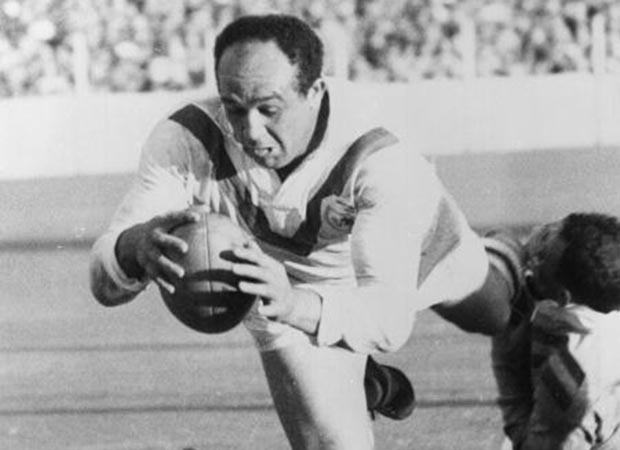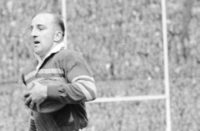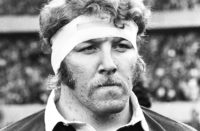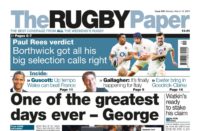 The world's first multi-racial rugby club, the one in Cardiff docks made famous by Billy Boston, is fighting for its life.
The world's first multi-racial rugby club, the one in Cardiff docks made famous by Billy Boston, is fighting for its life.
The Cardiff International Athletic Club whose formation in Tiger Bay 70 years ago ‘to embrace all races and religions reflecting the make-up of the local population', gave the game a League of Nations team second to none as well as a revered acronym.
The CIACS – motto Unus et Idem (one and the same) – took immense pride in their global dimension, a multi-ethnicity based on the players found on their doorstep. Where Mourad Boudjellal forked out millions for his international collection, the Ky-acks assembled theirs without paying a cent.
“Back in the Eighties our youth team had a Malayan scrum-half, an Arab at fly-half, two West Indians in the centre, two wings of Irish extraction and, a Jewish full-back,” says former player, secretary and lifetime CIAC Stuart Campbell. “Now all the docks' boys play is football. In our time, we've had every nationality in the world except an Eskimo.”
Any Native Indians sailing into Cardiff from Anchorage need only to bring a pair of boots to walk straight into the first-team, or at the very least onto a largely empty bench. Where the CIACS used to field six teams every week, now they struggle to field one.
As a club they produced far more than the incomparable Boston, whose lifetime achievement award from BBC Wales at Cardiff's Millennium Centre brought him back to the streets where he grew up.
Johnny Freeman and Colin Dixon, two other black players from the Bay, also made it big in Rugby League. Another CIAC, Joe Erskine, a neighbour of Boston's in Angelina Street and team-mate in the Cardiff Schools' XV of the late Forties, made it bigger still in the ring as British and Empire heavyweight champion.
David Willicombe, a Great Britain Test centre in the mid-70's, began with the CIACS when they were still among the most formidable junior clubs in Wales. Now they are wrestling with the weekly struggle to find 15 players, however limited.
They have failed more than once, hence their inability to fulfill more than four fixtures hitherto in the WRU's Division 3 East Central C. The results confirm that they are fighting a losing battle on the pitch as well as off it.
The CIACS have managed the sum total of 12 points from those four matches and conceded 333, leaking 49 tries in the course of scoring two. As chairman, Franklyn Parris could be forgiven for feeling like the boy on the burning deck.
“The last thing I want is for the club to fold, especially on my watch,” he says. “Once a club folds, as others have found, it's very hard to get it going again. Last year we had to cancel half our matches because we couldn't raise a team and it's the same struggle this season but at least we're still here.
“We've had to start matches with 12 players and on one occasion we were down to eleven. It's got to the ridiculous point where we've conceded 100 points once and 90-odd twice.
“In the last match we got beaten 60-odd at Llandrindod Wells. We only had 16 players which meant one sub and he was on after seven minutes. Because of injuries we finished up with 12 players.
“I could not have been more proud of them for the way they stuck at it. We buy those who turn up to play a pint, sometimes two but we've never paid a penny, certainly not since I've been involved.”
How, with such a skeletal operation, do they make ends meet? “We don't,” says Parris. “Llandrindod's a long way from Cardiff and hiring a coach cost £365. We have one or two people who sponsor the club but it's not fair on them.”
The CIAC's strong social conscience has set them apart from other clubs. When the WRU kept entertaining the racist Springboks despite South Africa having been expelled from the Olympics and football world-wide, the CIACS joined the anti-apartheid demonstrations.
“We led the march from the Bay,” says Arthur Duarte, a cousin of Boston's who has filled virtually every role from player to chairman during almost 70 years with the CIACS. “And we got a fair a bit of abuse for our trouble.”
When the miners needed support during the Winter of Discontent in the early 80's, the CIACS gave it without needing to be asked twice. Some at the club suspect those then running the WRU never forgave them.
“The WRU don't seem to make any allowance for our difficulty,” Parris says. “It feels almost as if they're kicking a dying man in the teeth. Some years ago we had an allocation of unsold international tickets. The Union said we could have a refund if we got them back by a certain time. We did. They gave us a receipt but no money.
“We were due over £600.We've tried to find out what's happened but we haven't got a chance against a big organisation like the WRU. We've tried to get students from the university to play for us.We used to get a few but they all packed it in for various reasons.
“We're proud to be a multi-cultural club and proud of what we've done but we feel let down. Other clubs are having to jump through the same hoops. Grass-roots is more or less finished in Wales. I just feel it's all about money and not about the game.
“We celebrated our 70th anniversary a few weeks ago. There is a danger that we will fold but we will keep going to the bitter end. To give up would be disrespectful to all those former players who have given the club a good name and gone out of their way to help us.
“Billy Boston always talks about the CIACS and always comes to see us whenever he can. Eddie Waring always used to give the club a mention on telly when he was commentating on the Rugby League Challenge Cup final for the BBC. The CIACS is a famous name but, in spite of that, people don't want to come and play for us.”
With Christmas coming, the perfect present for the CIACS is not too difficult to imagine. A preservation order from the WRU.


























